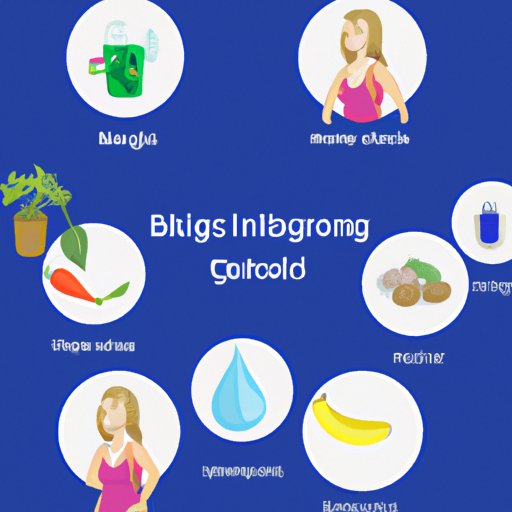Introduction
Bloating is a common digestive issue that can be uncomfortable and even painful. It’s characterized by a feeling of fullness or tightness in the abdomen, as well as visible swelling. While bloating can happen due to certain medical conditions, it’s often caused by lifestyle factors such as diet and stress.
Eat a High-Fiber Diet
Fiber helps keep your digestive system running smoothly, which can help reduce bloating. According to a study published in the Nutrition Journal, increasing fiber intake can reduce symptoms of bloating in individuals with irritable bowel syndrome (IBS).
High-fiber foods include fruits, vegetables, legumes, nuts, seeds, whole grains, and some dairy products. Eating a variety of these foods can help you get enough fiber and other important nutrients.
Drink Plenty of Water
Staying hydrated is important for overall health and may also help reduce bloating. A study published in the American Journal of Gastroenterology found that drinking more water can help reduce bloating in individuals with IBS.
Most people need about eight 8-ounce glasses of water per day. However, this amount can vary depending on activity level, climate, and other factors. If you’re not sure how much water to drink, talk to your doctor.
Avoid Trigger Foods
Certain foods can trigger bloating in some people. Common culprits include beans, cruciferous vegetables like broccoli and Brussels sprouts, dairy products, carbonated beverages, and processed foods.
If you experience frequent bloating, try keeping a food diary. Write down all the foods you eat and note any bloating that occurs. Over time, you may be able to identify certain foods that trigger bloating and eliminate them from your diet.
Exercise Regularly
Regular physical activity can help reduce bloating. Exercise stimulates digestion and helps move gas through the intestines, which can help relieve pressure and discomfort.
Aim for at least 30 minutes of moderate-intensity physical activity most days of the week. Examples include walking, jogging, cycling, swimming, and dancing.
Reduce Stress Levels
High levels of stress can worsen bloating. When you’re stressed, your body releases hormones that can slow down digestion, leading to bloating and other digestive issues.
To reduce stress, try activities like yoga, meditation, deep breathing, and journaling. Taking regular breaks throughout the day can also help.
Try Natural Remedies
There are many natural remedies that may help reduce bloating. For example, taking peppermint oil capsules has been shown to reduce symptoms of bloating in people with IBS.
Other natural remedies that may help include ginger, chamomile tea, probiotics, and apple cider vinegar. Talk to your doctor before trying any natural remedies to make sure they’re safe for you.
Conclusion
Bloating can be uncomfortable and even painful. Fortunately, there are several things you can do to reduce bloating. Eating a high-fiber diet, drinking plenty of water, avoiding trigger foods, exercising regularly, reducing stress levels, and trying natural remedies can all help.
By making these lifestyle changes, you can help prevent bloating and find relief when it does occur.
(Note: Is this article not meeting your expectations? Do you have knowledge or insights to share? Unlock new opportunities and expand your reach by joining our authors team. Click Registration to join us and share your expertise with our readers.)
